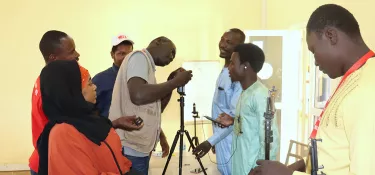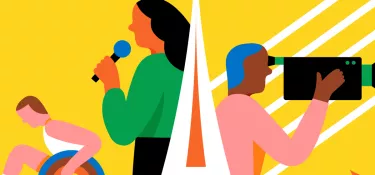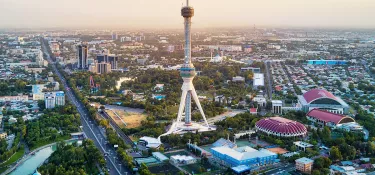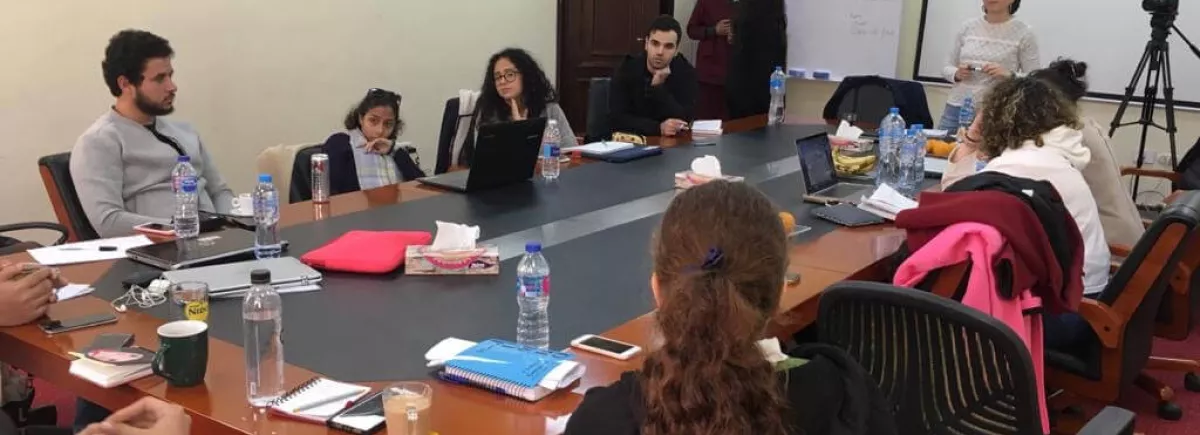
Women in transit
Related project
MediaLab CampusThe "Women in transit" project, winner of Médialab Campus 2019, and currently in the finalization phase.
Despite the still very strong uncertainties, the winning inter-school project leaders are organizing the postponement of their activities to the start of the 2020 academic year, as well as the interns, whose internships were planned for this summer.
The Lille School of Journalism, Cannes School of Journalism et British University in Cairo and joined forces to propose the “Women in transit" project as part of the CFI Médialab Campus.
The objective of the “Women in transit" project, launched in the fall of 2019, A cross perspective on a sensitive subject.was to make three 10 minutes long documentaries on a common theme, but in three different places: Cairo, with women dreaming of Europe, Ventimiglia, on the French-Italian border and in Calais with the candidates for migration to England. If each team was independent in the shootings, working together made it possible to bring a cross perspective on a sensitive and always topical subject.
Groupings took place in Cairo and Lille with the editors in chief and the trainer in charge of the project. They made it possible, first and foremost, to compare working methods, finalize the subjects' choice, discuss the constraints specific to each of them, and jointly consider solutions. In between each gathering, many skype meetings took place whether they were between the trainer and each of the schools or group meetings.
Students in Cairo also benefited from two days of specific training in film preparation and the journalistic intent in the image.
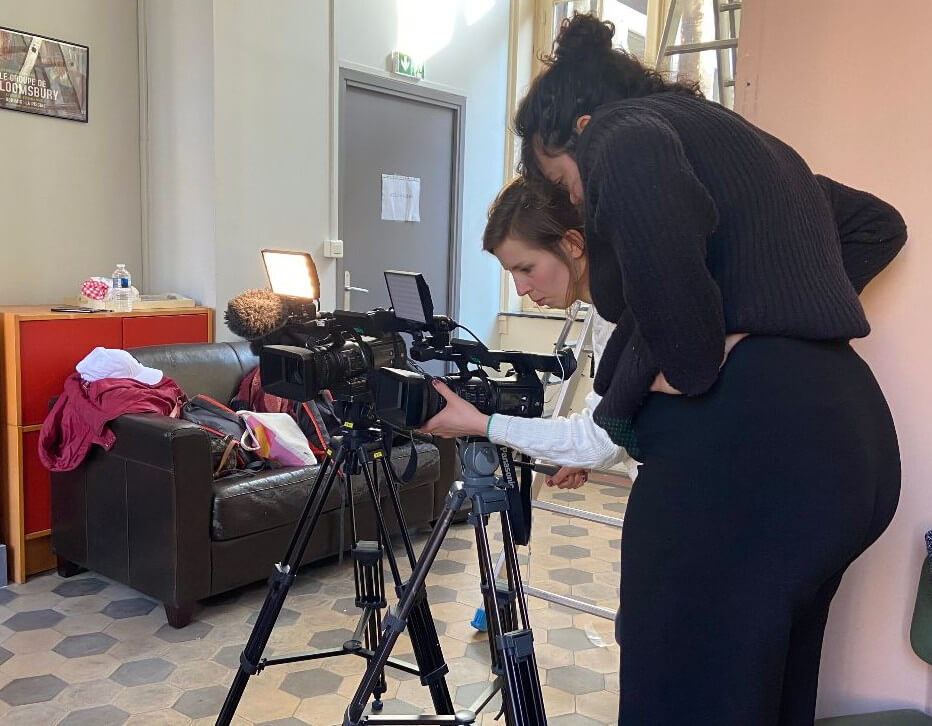
Difficulties related to the subject, to strikes, to coronavirus
After the first enthusiastic meetings, the difficulties of working on such a theme quickly popped up:
- In Calais, the students faced associations that were tired of the work of certain journalists who work in emergency. The work of building trust was long and ultimately failed. The students were forced to return to Lille, where associations are less sought after. But they had to start the approach work from scratch.
- There was hardship also in Ventimiglia. Most of the migrant camps on the Italian border have been dismantled and the associations agree that the migration crisis in Ventimiglia is over. The lower number of migrants has made it more complex to establish contact and maintain it over time. Several contacts could be established, but several women then "disappeared" without giving any news.

- The year-end strikes in France posed a problem for our trainer who saw two trips to Cannes postponed and one canceled. But support took place from a distance.
- The arrival of Covid-19 complicated the situation furthermore. If filming was done in Cairo and Cannes, it was not the case in Lille. With the closure of the school, the return of the students to their region of origin, confinement delayed the last two days of shooting, with the risk of losing contact with the main character of the film. The link was maintained, but the fluctuating day-to-day situation (asylum application in progress, health problem) of the character made it difficult to set the date of the last filming.
- A trip to Cairo, planned for the finalization of the synopsis before editing, was also canceled due to the Covid. Again, the planned support days were done remotely.
- In Cairo, the closure of the university makes editing software inaccessible. The film is edited but would need to be reworked for professional distribution.e.
An incredible experience for the students
Working on such a topic for students was undoubtedly very rewarding. " This experience was very rich and allowed us to learn and grow on a professional but also personal level", says Marjolaine Baud, chief editor of the project for the EJC. "We all agree that this experience has allowed us to acquire a great deal of knowledge about the situation of migrants on the Italian border.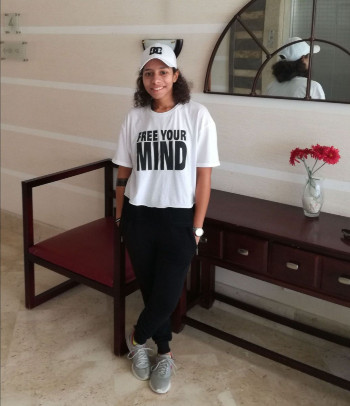 By reaching out to a certain number of associations but also to the woman who agreed to receive us, we now have a more global vision of the problems faced by a migrant arriving in France... Going into the field allowed us to gain more empathy and understanding with those we meet. Despite the presence of the camera between us, we made a beautiful bond with the woman we present in our documentary and we come out of it more mature... "
By reaching out to a certain number of associations but also to the woman who agreed to receive us, we now have a more global vision of the problems faced by a migrant arriving in France... Going into the field allowed us to gain more empathy and understanding with those we meet. Despite the presence of the camera between us, we made a beautiful bond with the woman we present in our documentary and we come out of it more mature... "
Same remark for Perrine Roguet, editor in chief of the project for ESJ Lille. " It was an experience that allowed us to meet this young woman, Eugenie. We also understood that we were able to deal with a sensitive subject like that of migration, but above all to identify with our character as young women."
Rawan Awel El-Sedfy, a student at the British University in Cairo, found it interesting to meet people of a different culture and a different nationality in her country and to see how they could adapt.
A successful collaboration
Beyond the theme, the collaboration between the schools was welcomed by the students. " The work with the schools of Cannes and Cairo was a source of incredible learning and meetings, which I could not have accomplished at this stage of my professional career without this project, underlines Perrine. It allowed me to see how other students see journalism and the different ways of working. In Cairo, I especially understood that the conditions for filming, for example in the street, are different and stricter than those authorized in France. By viewing each other's work, we were able to give each other advice and comments in order to move forward and improve."
In Cairo, I especially understood that the conditions for filming, for example in the street, are different and stricter than those authorized in France. By viewing each other's work, we were able to give each other advice and comments in order to move forward and improve."
Tibyan El Fateh, a Sudanese student at the British University in Cairo, found it rewarding to work with different people: " It changed my way of thinking, it allowed me to open my mind." Rawan Awel El-Sedfy found it interesting to share with the French students their vision of the subject and can't wait to see the final result.
For Marjolaine, " The collaboration with the other schools and with the trainer, Aliénor Carrière, was very beneficial because it allowed us to exchange, to have opinions and methods different from those that we are used to working with in our original school. We were also able to deepen our group work skills because we were not used to collaborating with five people. We had to adapt to each and everyone, to listen and to understand."
Salma Mostafa Ibrahim, an Egyptian student, was the project's chief editor for the Cairo University. She is enthusiastic about this experience that led her " to position herself as a leader, to have to make critical decisions, to share roles, and to manage time". She also appreciated her stay in Lille which gave her the opportunity to discover the approach of the ESJ in terms of training and more particularly in the making of documentaries. “Working with an expert gave me a clearer vision of the work of professionals, whereas as a student, I had not had the chance so far to practice in the 'real world'."
It changed my way of thinking, it allowed me to open my mind.For Rawan Awel El-Sedfy, the project was an opportunity to go into the field and not be satisfied with information collected on the Internet alone.
If the lack of free time was highlighted, all the students appreciated being able to work on a documentary, format rarely worked on in journalism school. Tibyan El Fateh says that this experience allowed her to take another look at documentaries. “ I realized the huge workload needed beforehand, to enable the documentary makers to describe the reality at hand. I am extremely grateful for this opportunity, because I am more than ever interested in making documentaries and many stories around us can be told."
Salma Mostafa Ibrahim also underlines the technical contributions of the project, from the preparation of the synopsis to the post-production. It was a very rewarding experience for us.
Ahmed Khalid Hossain, an Iraqi student at the British University in Cairo goes further and assures that " this project has increased his attraction to documentaries and that this experience will be decisive for his career." Despite the many difficulties encountered, Marjolaine concludes: " We gain from this experience but positive things. We encountered many obstacles and doubted a lot, but it taught us to push ourselves forward and persevere to achieve our goal. It was a very rewarding experience for us from the professional point of view as well as the personal."
